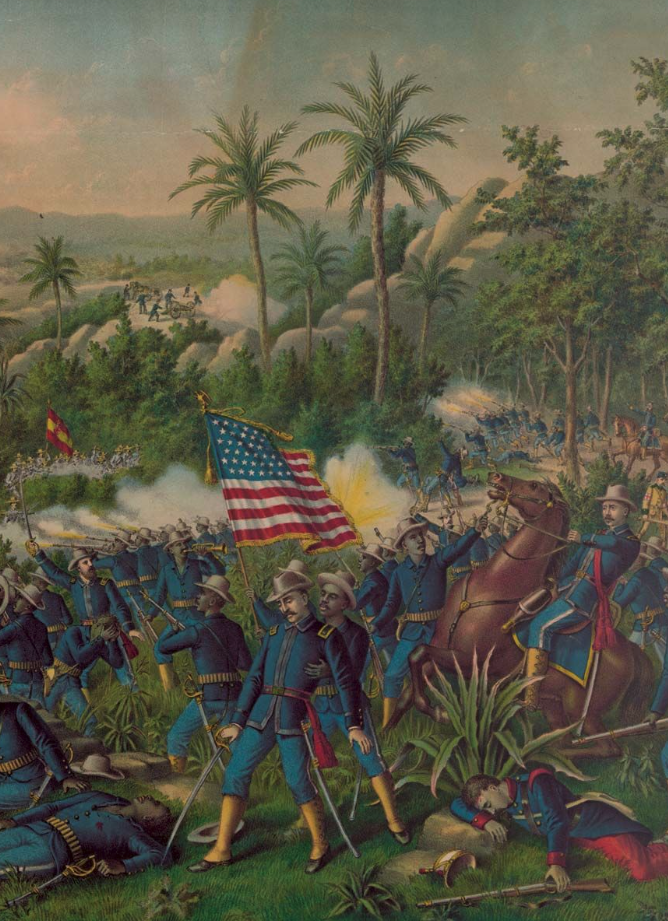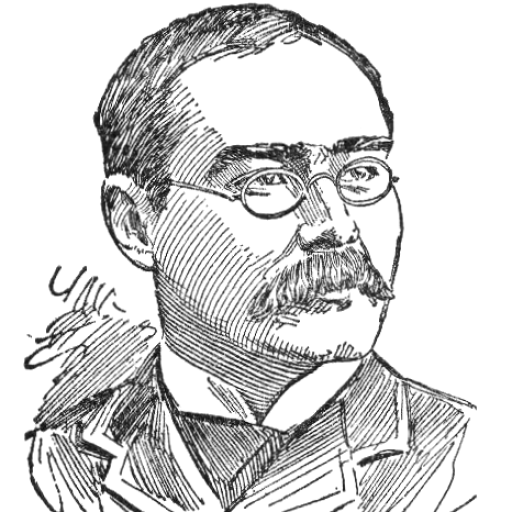Fill full the mouth of Famine and bid the sickness cease …

Kipling wrote ‘The White Man’s Burden’ as counsel and warning to the United States after it won the Spanish-American war (see illustration), took possession of the Philippine Islands and became a colonial power. Kipling sent the poem to his friend Theodore Roosevelt who qualified the poem as “poor poetry but good sense”. In 1904 he wrote to Kipling that the greatest accomplishment were his achievements in taking up this burden.
Probably no other poem by Kipling has been so vilified; probably more than any other poem it helped brand Kipling as a racist, which he was not – witness the loving and respectful treatment of Indians and other people of colour in his work, contrasted with the often derisive portrayal of Englishmen (compare for example Giffen with Gunga Din). The expression ‘White Man’ is frankly unfortunate. If Kipling were writing the poem today, he likely would have called it ‘The richer countries’ responsibility’ or something to that effect. Yet the message would have remained the same – “Fill full the mouth of Famine/and bid the sickness cease“.
The desire to assist people in poorer countries is a recurring theme in the Christian, Western set of values. To be sure, much of the Western assistance has been motivated by the desire to win converts, gain political influence or expand markets. Western aid was hardly as altruistic as this poem claims – “… to seek another’s profit, and work another’s gain…” Nevertheless, the aid always contained an element of genuine desire to help the less fortunate. Certainly the humanitarian assistance to areas of conflict and of natural disasters has been motivated by the wish to help people in distress and the feeling that “we are all in the same boat” – sometimes called Spaceship Earth. Yet, many international aid workers would regretfully acknowledge the truth of Kipling’s words – “And when your goal is nearest / The end for others sought,/ Watch Sloth and heathen Folly / Bring all your hope to nought“.

Furthermore, the poem is not a justification of the way the colonial powers did actually wield power in the poorer countries, but an appeal to how they should. It is indeed regrettable that the US did not follow Kipling’s counsel in those countries where it was the dominant power – particularly in Latin America and the Caribbean. Whereas Britain and France took responsibility for administrating the countries they colonized and undertook to provide their subjects a certain level of health and education, security and rule of law, the US in Latin America and the Caribbean restricted itself to exploiting the resources (e.g. oil, bananas) and supported any petty dictator who oppressed and impoverished his people, as long as he supported the US commercial interests. Our record of backing the Somozas, Trujillos and Pinochets is a sorry one, and has contributed a lot to the continuing mass poverty and corrupt government in most of Latin America and the Caribbean.
Caricaturists loved to ridicule this poem (illustration by Victor Gillam, Judge magazine, 1 April 1899. But now that countries in the South have had over two generations of independence maybe it is worth reassessment.
The White Man’s Burden
Take up the White Man's burden - Send forth the best ye breed - Go bind your sons to exile To serve your captives' need; To wait in heavy harness On fluttered folk and wild - Your new-caught, sullen peoples, Half devil and half child. Take up the White Man's burden - In patience to abide, To veil the threat of terror And check the show of pride; By open speech and simple, An hundred times made plain, To seek another's profit, And work another's gain. Take up the White Man's burden - The savage wars of peace - Fill full the mouth of Famine And bid the sickness cease; And when your goal is nearest The end for others sought, Watch Sloth and heathen Folly Bring all your hope to nought. Take up the White Man's burden - No tawdry rule of kings, But toil of serf and sweeper - The tale of common things. The ports ye shall not enter, The roads ye shall not tread, Go make them with your living, And mark them with your dead! Take up the White Man's burden - And reap his old reward: The blame of those ye better, The hate of those ye guard - The cry of hosts ye humour (Ah, slowly!) toward the light: - "Why brought ye us from bondage, "Our loved Egyptian night?" Take up the White Man's burden - Ye dare not stoop to less - Nor call too loud on Freedom To cloak you weariness; By all ye cry or whisper, By all ye leave or do, The silent, sullen peoples Shall weigh your Gods and you. Take up the White Man's burden - Have done with childish days - The lightly proffered laurel, The easy, ungrudged praise. Comes now, to search your manhood Through all the thankless years, Cold-edged with dear-bought wisdom, The judgment of your peers!
